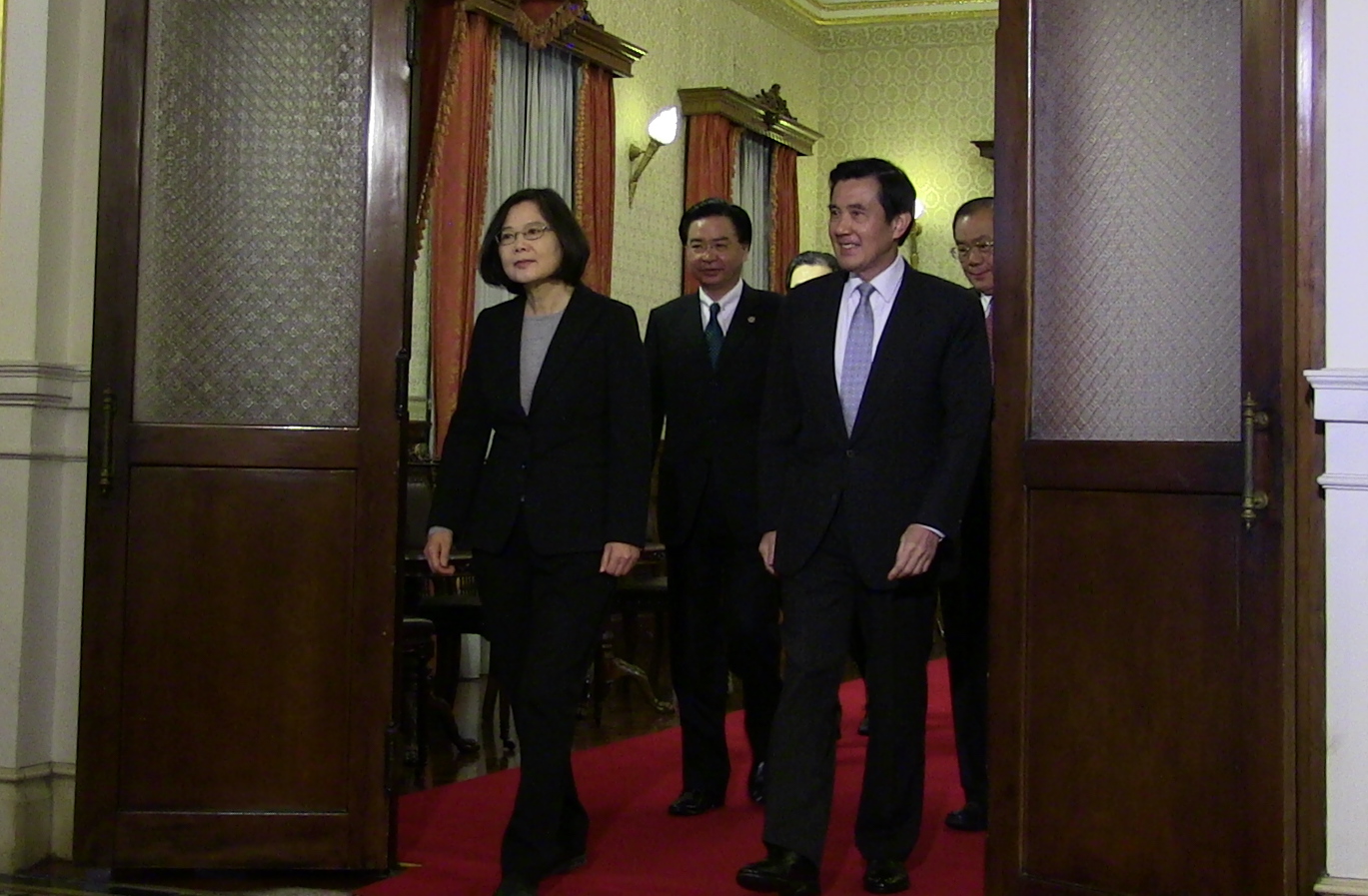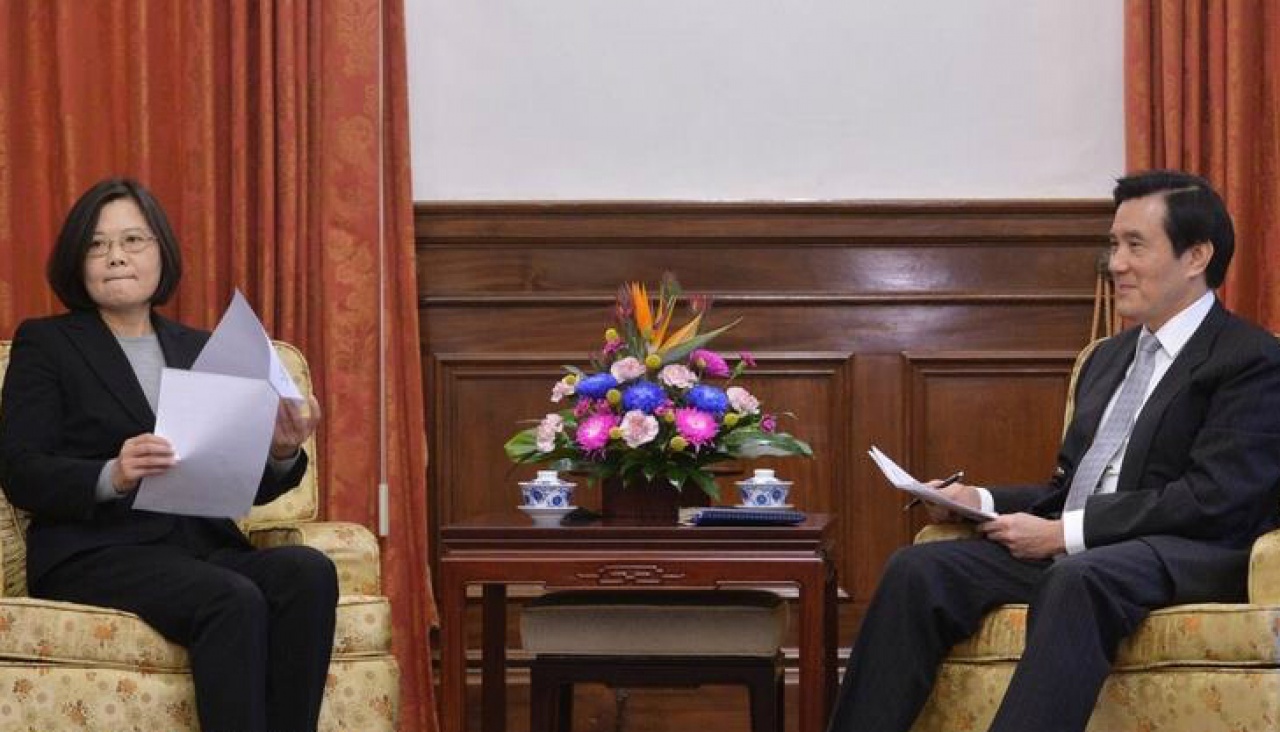by Brian Hioe
語言:
English
Photo Credit: Presidential Office
OUTGOING Taiwanese president Ma Ying-Jeou and incoming president-elect Tsai Ing-Wen met in Taipei on Wednesday in order to discuss the upcoming transition of power between a KMT and DPP presidency. This will be the third presidential transition of power between parties in Taiwanese history, the first being the transfer of power from KMT to DPP with the victory of Chen Shui-Bian as the first non-KMT president in Taiwanese history in 2000, and the second being the transfer of power back to KMT hands with the victory of Ma Ying-Jeou in 2008.
The question of power transition between Ma and Tsai has been a tense one. It was expected far in advance that Tsai would be victorious, but in the months preceding presidential elections, it appeared that Ma would not be willing to go simply into the good night as a lame duck president. Last minute curveballs include Ma’s meeting with Xi Jinping in Singapore in November and Ma’s visit to the disputed island of Itu Aba in January, which may have ramifications for Tsai’s future foreign affairs.
In regards to Ma’s actions, he has stressed in the past that he did not wish to simply end his term as a “caretaker” for the upcoming presidential administration, seeing as he still has several months left in his term. But some of Ma and the KMT’s actions seem designed to pose future obstacles for a Tsai administration. The recent lowering of electric prices with such timing as to mean that electric bill prices will need to be raised in the next four years may be designed to sabotage Tsai, seeing as the raising of electric bill prices would negatively affect approval of her administration. Moreover, the renaming of an auditorium in the Presidential Office Building to “Chiang Ching-Kuo Hall” may be as a challenge to the incoming DPP administration, allowing the KMT to cry foul and accuse the DPP of vindictiveness in the name of transitional justice should Tsai try to rename the hall.
 Photo credit: 夏小华/RFA
Photo credit: 夏小华/RFA
It is such that there have in fact, been calls for a shorter transition period between presidential administrations after elections and even the call for Ma Ying-Jeou to be impeached in order that Tsai can take office more quickly. Certainly, impeachment proceedings against Ma would likely have an extremely negative effect on the incoming DPP administration, creating public perceptions of vindictiveness against the preceding administration perhaps in line with the arrest of Chen Shui-Bian after the end of his second presidential term.
But this would point towards how presidential transitions of power in Taiwan are unstable in nature, as a product of the fact that Taiwan only has a recent history of democratic elections, and is far from a country with a stable democratic system. Yet the fact is that Tsai has had to go easy on Ma, in some sense, as Ma has thrown curveballs at her future presidential administration because of her need to appear fair, balanced, and bipartisan, rather than out to get the KMT along partisan party lines.
The meeting between Ma and Tsai is, in this sense, probably a photo op for appearances more than anything, the real process of transitioning administrations occurring behind the scenes. Real disagreements between both would also not be voiced so publicly during the meeting. But from the part of the meeting which media was allowed access to and from both party’s statements after the meeting, we can see what issues will be sources of future tensions between the DPP and KMT under a Tsai administration.
The cross-straits issue was brought up quickly during the opening statements of Tsai and Ma, for example, with Tsai again maintaining that she intends to conduct cross-strait relations under the ROC constitution. Ma also used the meeting as an opportunity to press Tsai on the issues of South China Seas islands which are claimed by Taiwan, but also claimed by China, Japan, Vietnam, and the Philippines. Tsai has in the past maintained the territorial claims of Taiwan under the ROC framework, including Taiwan’s claim to the Senkaku/Diaoyu Islands. The KMT in particular, however, is loathe to give up Taiwan’s claims to South China Seas Islands under the ROC framework. Notably, the 1992 Consensus was not explicitly touched upon during the meeting. It is currently questioned by members of civil society as to whether DPP’s recent draft bill to provide oversight over cross-strait relations is substantially different enough from the KMT’s version of the draft bill.
Energy was another significant issue brought up. What is a matter of controversy is the KMT’s push for nuclear energy and Tsai Ing-Wen’s opposition to nuclear energy. The KMT has in the past raised questions for Tsai and the DPP as to how they intend to meet Taiwan’s energy needs without nuclear energy, citing the challenges of switching to renewable forms of power. The cut in electric bill prices by the KMT at present, which will lead to raises in the future, may be to raise demand for nuclear energy as a cheap energy source. As is not surprising, during the meeting, Ma expressed such criticisms of plans to switch away from nuclear energy. According to DPP secretary-general Joseph Wu, Tsai responded to this by this raising questions of nuclear disposal in Taiwan and Taiwan’s need to find energy sources appropriate to its particularities as a country.
Tsai and Ma also discussed the need to reform Taiwan’s educational system. Ma expressed the wish to push for vocational schools in Taiwan, which was a point Tsai had agreed upon during her past campaign. Tsai expressed also the desire to pluralize the choices available to teenagers before college. Ma suggested Tsai could yoke education reform to her New Southwards Policy, citing that Taiwanese economic development in Southeast Asia could provide new educational opportunities for attracting students to Taiwan.
Likewise, the question of reforming Taiwan’s pension system, which has been an issue for some time, was raised during the meeting. Namely, Taiwan’s current pension system for retired public servants is unsustainable, with high pension payments made to military personnel, public school teachers and civil servants after retirement, in some cases higher than the pay they received while working. The Taiwanese government will not be able to maintain this current system, reports indicating that the public servant pension fund ran into deficit for the first time in early 2015.
 Photo credit: CNA
Photo credit: CNA
Indeed, some reports claim as high as 60 percent of the Taiwan’s annual income taxes is spent on pensions for retired public servants, and it is feared that this will cause financial crisis for the government in the future. An increasingly aged population and an increasing amount of pensioners as a result will be another challenge. Both political camps in Taiwan have raised the need to reform the pension system in the past, but no clear solution has yet emerged. In the past, the pension system served as a way for the KMT to reward political supporters, however.
Thus, from the meeting, we can see the future shape of future tensions between DPP and KMT under a Tsai Ing-Wen presidency. But we may note Ma’s actions against Tsai which are, in fact, aimed at sabotaging Tsai’s future presidency and that Tsai is unable at present to go after Ma for the reason that she would be perceived as acting in the interests of revenge against the KMT. We will see as to how future party tensions shape up in the future.


 Photo credit: 夏小华/RFA
Photo credit: 夏小华/RFA Photo credit: CNA
Photo credit: CNA